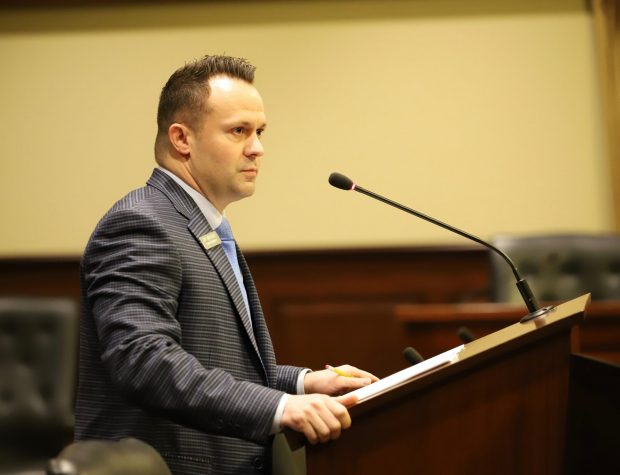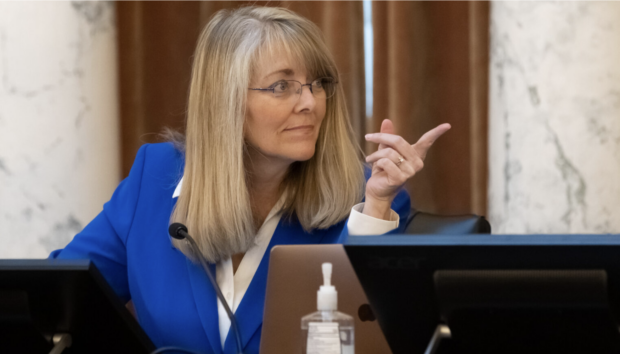July 1 marked the start of the state’s new fiscal year, which coincides with the effective date for many laws the Idaho Legislature adopted during its annual session.
The Legislature introduced 718 bills — 92 related to education — during the session, which ran for 94 days from January to April. Lawmakers passed, and Gov. Brad Little signed, 330 of these legislative acts.
While many were run-of-the-mill — such as agency budgets and small fixes to existing law — some bills made major changes to education policy. One controversial new law, seeking to restrict library material accessible to children, sparked protests across the state this week.
Other changes may have flown under the radar. That includes a new financial penalty for school districts that don’t publicize their capacity for open enrollment transfers.
Here’s a rundown of the new school-related policies that went into effect Monday:
‘Harmful’ library materials restricted
House Bill 710 required public libraries and school libraries — public and private — to implement procedures allowing patrons to challenge content they consider inappropriate for minors.
These procedures include a material reconsideration form, which must refer to the “harmful to minors” definition in Idaho law and must be accessible on the library’s website. Libraries must also create committees that review requests to reconsider a book’s place in the library’s collection.

The committee has 60 days to review a reconsideration request, after which the library could face a $250 fine along with potential civil damages. If the committee deems the material “harmful to minors,” it must be removed from the library or placed in an area restricted to minors, such as an “adults-only” section or behind a desk.
However, the Idaho School Boards Association has warned that removing or restricting material could raise First Amendment concerns, and libraries should “take great care to avoid restricting materials that are constitutionally protected.”
Rep. Jaron Crane, R-Nampa, sponsored HB 710, along with Senate President Pro Tem Chuck Winder, R-Boise, and House Speaker Mike Moyle, R-Star.
Teachers protected for refusing to use pronouns
School districts can no longer have policies requiring teachers, staff and administrators to use students’ preferred pronouns.
House Bill 538 broadly enacted protections for public employees, including teachers, who are unwilling to use someone’s preferred name and pronouns. Per the new law, school districts can be sued for disciplining such an employee.
Additionally, the new law bars teachers from referring to a student by a pronoun that doesn’t align with their birth sex, unless the teacher has parental consent.
Rep. Ted Hill, R-Eagle, sponsored HB 538.
School funding tied to open enrollment transparency
The 2023 Legislature passed an open enrollment law, requiring school districts to accept students who live outside of their boundaries — as long as there’s space. The law also required districts to post their capacity for transfers online.
This year, lawmakers put some teeth into those transparency requirements. If a district doesn’t post its open enrollment capacity, the state will withhold the district’s November payment — one of a handful of state funding tranches that districts receive each year.

Rep. Wendy Horman, R-Idaho Falls, proposed the penalty, which was part of this year’s public schools budget.
“There’s a lot of reasons children might be looking for a different setting,” Horman recently told Idaho Education News. “We just want to make sure that parents have that ability to see what other options within the public school system they have.”
The open enrollment law only applies to traditional public schools. Charter schools continue to use their lottery enrollment process.
Parental consent required for child health care
Senate Bill 1329 added new restrictions on health care providers that serve children, but it’s unlikely to significantly change existing school policies around student medical care.
The bill, sponsored by Senate Majority Leader Kelly Anthon, R-Burley, required parental consent for almost all medical treatment for children. It also required health care providers to disclose a child’s health records to their parents.

The bill applies to schools, which provide health screenings for students and administer medications and emergency care, among other medical services. However, existing state law — preceding SB 1329 — already requires schools to notify parents of health services they provide before each school year. The existing law also requires parental consent for those services, and gives parents the right to access their child’s health records.
“We did not believe that SB 1329 would have much change in recommended practice for school districts and charters,” said Quinn Perry, deputy director for the School Boards Association, “as they are already typically requiring parent permission for most, if not all, medical services, medications, etc.”
Advocates have raised concerns that the new law will limit young people’s access to health care. The Idaho Press reported on those concerns earlier this year.
Diversity statements barred
Senate Bill 1274 explicitly barred colleges and universities from using diversity statements as a condition for employee hiring and student admissions. Colleges and universities already weren’t requiring diversity statements from job applicants or students, the State Board of Education said.
Advanced Opportunities expanded
High school students can spend more money through the Advanced Opportunities program.
House Bill 454 increased the scholarship by $500 for public school students and $1,750 for nonpublic school students. The bill also allowed students to spend up to $1,000 on a career-technical course, up from $500.
Public school students will now get $4,625, and nonpublic school students will get $2,500.
Charter school regulations overhauled
House Bill 422 made sweeping changes to regulations governing charter schools.
While the bill became effective when Little signed it in February, the Public Charter School Commission in recent months has been crafting policies to align with the legislation.
Last week, the commission adopted changes to performance certificates and frameworks meant to boost charter autonomy and narrow evaluation metrics.
Immunization opt-out available
House Bill 597 allowed students 18 or older to opt out of immunizations required by their school, college, university or career-technical program.
